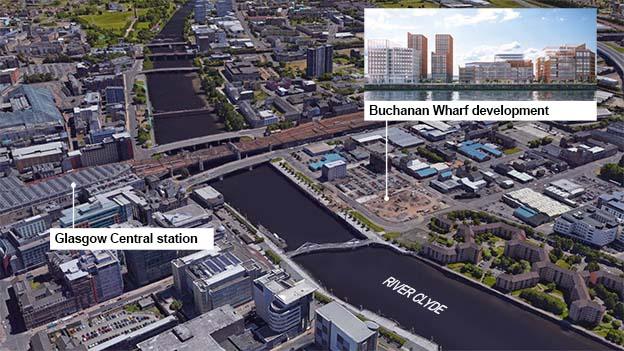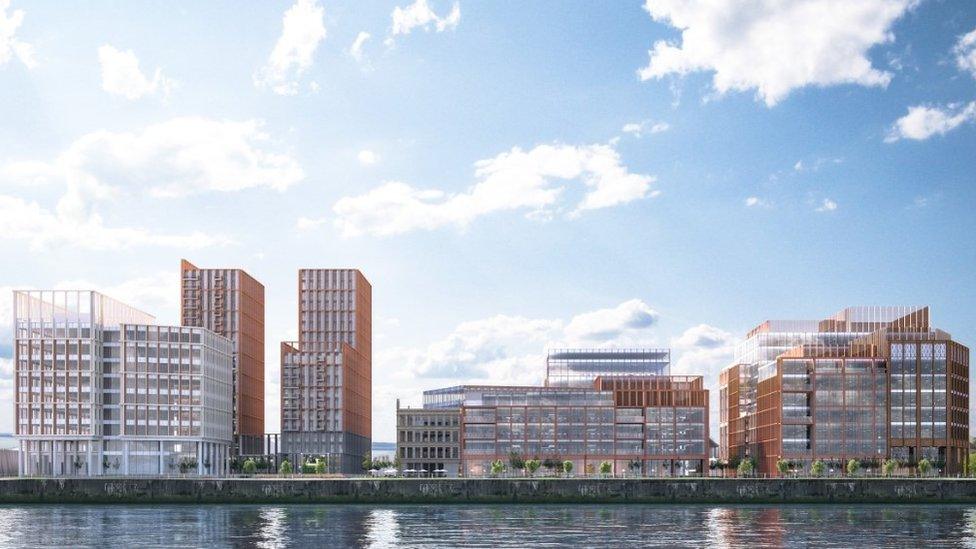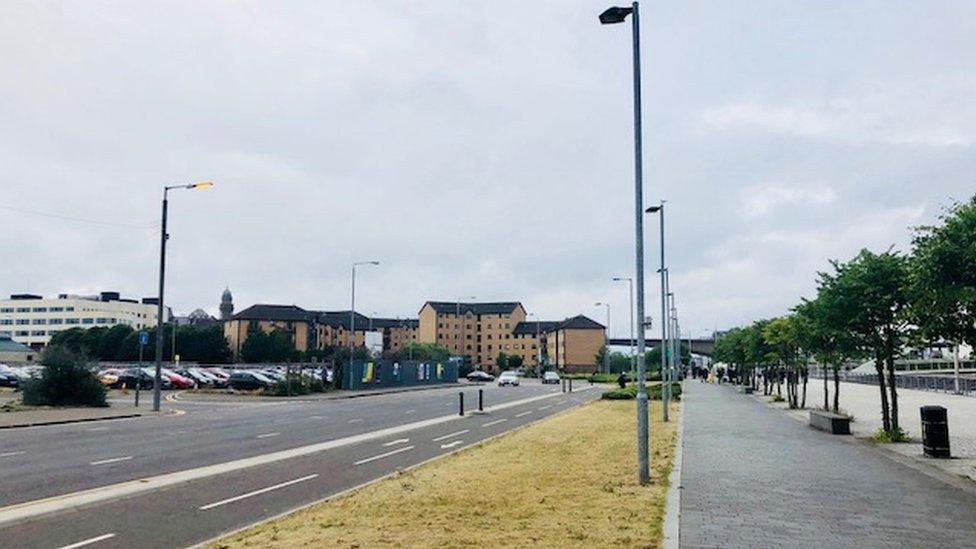Barclays plans 2,500 new jobs in Glasgow
- Published
- comments
The bank will house its technology, functions and operations teams at the new hub
Barclays has unveiled plans to create up to 2,500 jobs at a new hub in Glasgow, in a major boost to Scotland's financial services sector.
The bank will house its technology, functions and operations teams at a campus at the planned Buchanan Wharf development on the banks of the Clyde.
Barclays said it would "play a pivotal role" in its "long-term strategic priorities".
The move would double Barclays' current workforce in Scotland.
Barclays has agreed to purchase the campus development from Drum Property Group and is currently finalising the design of the new facility as part of the wider Buchanan Wharf development.
The bank's existing Scottish operations are expected to start transferring to the new campus from 2021.

Barclays says up to 5,000 staff will be based at the new Buchanan Wharf campus

Scottish Enterprise has agreed to provide a grant of £12.75m towards the project.
The offer requires that at least 42% of the new jobs are of "high value", with at least 341 posts made available for disadvantaged workers or those who have a disability.
The development will make the bank one of Glasgow's largest commercial employers.
Paul Compton, chief operating officer at Barclays, said: "The Glasgow campus, alongside others in Whippany, New Jersey, and Pune, India, is part of a global strategy to create world-class facilities for our functions, technology and operations teams.
"This new campus at Buchanan Wharf is a flagship project for the bank, which builds on Barclays' long history in Scotland and clearly demonstrates our commitment to supporting the UK economy."
'Transformational'
Scotland's first minister, Nicola Sturgeon, said the project would be "transformational for Glasgow".
"This is fantastic news for Glasgow. This is the kind of investment that will create lots of jobs ... but it is also the kind of investment that will be transformational for this part of the city.
"It is likely to act as a magnet for other investment that will see the regeneration of a part of Glasgow that has long needed it."
She added: "The new campus will strengthen Glasgow's financial services sector and shows Scotland continues to be a highly attractive location for inward investment.
"I am particularly pleased that as part of this investment, Barclays has committed to employing local people who often face barriers into work, including those with disabilities and young people."

How the site in Tradeston looks at the moment
Paul Lewis, from Scottish Enterprise, said: "This investment establishes Glasgow as a key global site for Barclays, providing a platform for growth whilst also securing existing operations in Scotland.
"It will breathe new life into a part of the city with huge potential and bring significant new jobs, including employment specifically for disadvantaged workers."
Buchanan Wharf is a major mixed-use scheme currently being developed by Drum Property Group.
Drum managing director Graeme Bone said the project was "setting a new benchmark for large scale development across Scotland"
He added: "Our development will be one of Scotland's largest single-site construction projects, bringing together over a million square feet of prime Grade A office space with residential accommodation, and an exciting mix of amenities and landscaped public spaces."

Analysis by Douglas Fraser, BBC Scotland business/economy editor
The prospect of up to 2,500 more Barclays jobs in Glasgow is very good news for the city in several ways, but it should also be treated with some caution:
It is a decision being made by an employer that isn't taking a risk on Glasgow's workforce, but making a judgement on a pool of labour that it already knows well. That's a big vote of confidence.
It sends a strong signal to others in the sector to look to the Scottish workforce for back office and technology roles, including those at the higher end.
That's particularly true of those looking to move to locations with lower costs than London. HSBC has chosen Birmingham for a new base.
The message will travel beyond an audience of senior managers in the UK. While other banks have shrunk their global ambitions, Barclays is making its strategic choices across three continents.
The city centre is badly in need of a regenerative lift, particularly the Tradeston district, where too many blocks are empty or decaying.
The move will focus attention more on the riverfront, which has had substantial investment, but has not yet become a focus for city life.
The outline plan for Buchanan Wharf is to have enough office space for 7,000 people, and 300 new homes, so in time, Barclays' development ought to bring along that additional capacity.
But two words of caution: the numbers are "up to 2,500 jobs". And as some of them are being relocated from London and possibly elsewhere, Glasgow will still have to fight and make its case if that potential number is to be reached.
The other: banking is changing very fast, and the pace is about to pick up. Many jobs are vulnerable to being replaced by technological advances.
While some of those will be developed by Barclays' workforce in Glasgow, those working in the sector can't afford to be complacent. Expect continuing employment churn.